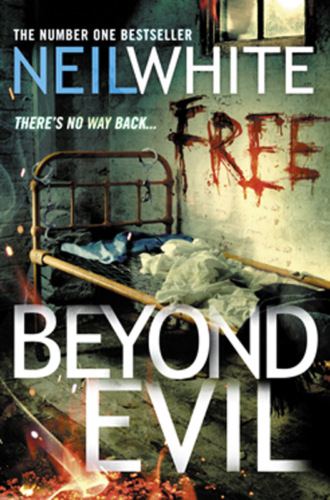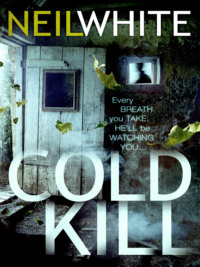
Полная версия
BEYOND EVIL

NEIL WHITE
Beyond Evil

To everyone at Avon
Table of Contents
Title Page
Dedication
Chapter One
Chapter Two
Chapter Three
Chapter Four
Chapter Five
Chapter Six
Chapter Seven
Chapter Eight
Chapter Nine
Chapter Ten
Chapter Eleven
Chapter Twelve
Chapter Thirteen
Chapter Fourteen
Chapter Fifteen
Chapter Sixteen
Chapter Seventeen
Chapter Eighteen
Chapter Nineteen
Chapter Twenty
Chapter Twenty-One
Chapter Twenty-Two
Chapter Twenty-Three
Chapter Twenty-Four
Chapter Twenty-Five
Chapter Twenty-Six
Chapter Twenty-Seven
Chapter Twenty-Eight
Chapter Twenty-Nine
Chapter Thirty
Chapter Thirty-One
Chapter Thirty-Two
Chapter Thirty-Three
Chapter Thirty-Four
Chapter Thirty-Five
Chapter Thirty-Six
Chapter Thirty-Seven
Chapter Thirty-Eight
Chapter Thirty-Nine
Chapter Forty
Chapter Forty-One
Chapter Forty-Two
Chapter Forty-Three
Chapter Forty-Four
Chapter Forty-Five
Chapter Forty-Six
Chapter Forty-Seven
Chapter Forty-Eight
Chapter Forty-Nine
Chapter Fifty
Chapter Fifty-One
Chapter Fifty-Two
Chapter Fifty-Three
Chapter Fifty-Four
Chapter Fifty-Five
Chapter Fifty-Six
Chapter Fifty-Seven
Chapter Fifty-Eight
Chapter Fifty-Nine
Chapter Sixty
Chapter Sixty-One
Chapter Sixty-Two
Chapter Sixty-Three
Chapter Sixty-Four
Chapter Sixty-Five
Chapter Sixty-Six
Chapter Sixty-Seven
Acknowledgements
Neil White’s Writing Tips
About the Author
By the same author
Copyright
About the Publisher
Chapter One
The blue flickers of the police lights dominated the view as Sheldon Brown looked out of his windscreen. He’d had the call thirty minutes earlier, and so had scrambled out of bed, the fatigue chased away by adrenaline. That had faded, replaced by the rhythm of his heartbeat, like flutters in his chest.
Sheldon reached into his trouser pocket and pulled out his bottle of diazepam, small blue wonders. He washed two down with a bottle of water. They wouldn’t take effect straight away, he knew that, but just the act of taking them made his fingers tremble less. He checked his reflection in the car mirror, that his tie was straight, his shirt not too creased. He didn’t look too bad. It was the middle of the night. That would give him some latitude.
He stepped out of his car and pulled at his shirt cuffs. The cold hit him straight away. It was summer, but the night air never stayed warm in Oulton, the Lancashire town that had become the hub of his police career. He had started out in the town as a young cadet, a few years spent sorting out the fights that spilled out from the pubs, the licensing hours just a guide, not a rule. His rise through the detective ranks took him to the larger towns in the county, but eventually he made his way back.
Oulton was the last stop before the moors, where the roads out of the valleys snaked upwards and towards Yorkshire, where there were few trees to stop the howl of the wind, just coarse grasses that grew wild. The town didn’t offer much for tourists other than a starting point to go somewhere else. There was a small maze of shops, once family-run businesses turned into charity shops and nail salons, but most of the pubs were boarded up now, victims of supermarket booze and the smoking ban. Weather-beaten terraced streets ran up the hills to empty patches of land where factories used to dominate. Some of the houses were rendered and painted in pastel shades, except that exhaust fumes and cold winters had turned them shabby, so that they were just dirty breaks in the lines of grey stone.
There were some elegant spots though, where the mill-owners had lived, grand stone gestures set in their own grounds, with curving gravel drives and wide lawns, nymph statues spraying water into lily ponds. The mills were gone, and so they made for large country hotels, used for weddings and by those walkers who liked to start their hikes as near to the top of the hills as they could.
Sheldon was in front of one of these hotels, the drive lined by marked police cars, headlights illuminating a huddle of people in uniform slacks and shirts. Ivy spread over dark grey walls and around white lattice windows, with wide glass conservatories along both sides. He took his suit jacket from the hook in the back of his car, and once buttoned up, he took a deep breath and set off walking. Just take command, was his thought, as he got closer. He tugged at his cuffs again. The gravel crunched under his feet, like loud cracks in the night. There were people looking out of their bedroom windows, curiosity beating sleep.
A uniformed officer walked towards him, his fluorescent jacket bright green in the darkness, bouncing back the weak light from the faux Victorian lamps that lined the driveway. His arms were outstretched, ready to turn him away. Sheldon pulled out his identification and said, ‘What time did the call come in?’
The constable held his hand up in apology and said, ‘Just after one, sir.’
‘Who’s supervising the scene?’ Sheldon said.
‘Sergeant Peters.’
Sheldon knew her. Tracey Peters, smart and ambitious, but normally on the burglary team.
‘You’re the first inspector to arrive, sir.’
Sheldon nodded, just to stop the panic rising. This could become his case, but he had to control it.
‘So what have you heard?’ Sheldon said.
‘You won’t like it, sir.’
‘I don’t expect to like it,’ Sheldon said, the words coming out clipped and precise. ‘I said what have we got?’
A blush crept up the constable’s cheeks. ‘A male, dead, in there,’ and he pointed towards the hotel. ‘There was a complaint about noise, and when the duty manager went to the room, he found a body.’
‘Any word on who it is?’
‘The room was booked in the name of John Bull, so I heard, but that sounds like, well …’
‘Bullshit?’
‘That’s the one.’
Sheldon set off for the front of the hotel. He went to a plastic crate filled with forensic suits, hooded paper jumpsuits packed into plastic wrappers. He ripped at the polythene and slipped one on over his clothes. Once he had snapped on the face mask, he set off to join the small huddle of white paper suits just outside the hotel doors.
The crowd turned to look at him as he joined, and when they realised who it was, Sheldon spotted the exchange of glances, the raised eyebrows.
‘How bad is it?’ Sheldon asked.
‘As bad as anything I’ve ever seen,’ someone said. He recognised the voice, and the long dark lashes blinking over the mask. Tracey Peters.
Sheldon nodded, and tried a smile. ‘A bit different to looking at overturned furniture,’ he said, and then, ‘how much of a mess have the staff made?’
‘No one stayed long enough to get near the body. As soon as they looked inside, they backed away, screaming.’
Sheldon looked towards the building but didn’t say anything for a while. He looked up at the bedrooms. Someone was taking photographs with a phone. A tale for the dinner party.
‘Let’s take a look,’ he said, and walked around the small huddle. He heard the boots of Tracey Peters behind him.
He climbed the hotel steps quickly and went through the revolving door. His footsteps echoed in the marble lobby, a walnut reception desk in front of him, a brass plaque reminding him of the hotel name. Sweeping stairways curled upwards behind it, lined in plush wine-coloured carpets.
Tracey stepped in front. ‘It’s at the back,’ she said, and led him away from reception and through a long room filled with high-backed chairs and a large stone fireplace.
They turned into a long corridor lined by doors. There were plates outside some, remnants of room service. Neither said anything. All he could hear was the rustle of their paper suits. His eyes scanned the walls for any blood smears that might have been missed, but it looked clean. At the end of the corridor, by an open fire door, he saw the bright glare of arc lights coming from one of the rooms and the bustle of more white forensic suits.
The crime scene investigators stepped aside as he got near. One was dusting the glass on the fire door, hoping for a print. Another was swabbing the doorframe for DNA, in case someone grabbed the door on the way out.
‘Anything yet?’ Sheldon said.
The dusting stopped for a moment and the tired eyes of a middle-aged man turned to him. ‘Nothing much, sir. All the blood is on the bed. No footprints in the room. There were handprints, but they were smears, and so no good for getting any prints.’
‘I’ll need to speak to everyone who was using rooms along this corridor, and the night manager,’ Sheldon said.
‘He’s been trying to get in the way since we got here, worried about his business,’ Tracey said.
‘He’ll have to keep worrying,’ Sheldon said, and then went into the room. He shielded his eyes as they became used to the glare of the lights, and once he was able to take in the scene, sweat prickled across his forehead and his mouth filled with acid. He looked away for a moment and took a deep breath. Once he knew that he was able to look again, he slowly raised his head.
There was a man in front of them, lying spread-eagled on a bed, his arms and legs pulled to the corners and tied to the bed legs.
‘That’s some extreme sex game,’ Tracey said, and she pointed to a ball gag that was discarded in the corner of the room, a leather strap with a plastic ball in the centre. Sheldon thought he could see teeth marks in it.
Sheldon let out a long breath. ‘I don’t think he was enjoying it,’ he said, and took a step closer, leaving Tracey nearer the door.
The man was naked. He didn’t look old, the Maori tattoos that swirled down from his shoulders giving that away, but it was what was above his shoulders that made Sheldon wonder if he’d sleep again that night.
There was a shock of black hair on the pillow, slick with blood, because where the face had once been there was just the bright white of cheek and jawbones, streaked red by blood and remnants of torn flesh and muscle. The eyes were still in place, and teeth seemed set in some final grimace. The face had been cut away in a neat shield, as if a stencil had been used.
‘Why would someone do that?’ Tracey said.
‘It makes him harder to identify, but that can’t be the reason,’ Sheldon said, his voice quieter than before. ‘Is the face still here somewhere?’
Tracey shook her head. ‘Not in this room.’
Sheldon closed his eyes.
‘There is a bit more to this,’ he heard Tracey say.
Sheldon opened his eyes and looked at her. ‘In what way?’
‘I spoke to the police doctor when he left,’ she said, and then raised her eyebrows. ‘He thought that the victim had been alive when it started.’
Sheldon looked back to the body on the bed and shook his head. The constable outside was right. This was going to be a bad one.
Chapter Two
The noise started in his dream. There was a bird on a branch, bright red and blue feathers, chirruping at him, but then the bird faded and the room came into view.
He was in bed and the chirrups were still there, except that they were now electronic. He groaned and put his head under the pillow. It was the telephone. He could ignore it, just wait for the answer machine, but then he realised that he couldn’t let it do that. He might need the call.
He threw the pillow to one side and stumbled out of bed. The floor swayed under his feet. He tasted the booze as he exhaled, stale and unpleasant, and then he pulled the discarded T-shirt from the front of the clock radio. Eight o’clock. Later than he thought.
The phone was still ringing.
‘All right, all right,’ he shouted, and made his way through his apartment, wiping his eyes. The answer machine beat him to it.
‘Charlie. It’s Julie. I can’t make it this afternoon. There’s been a murder. It was supposed to be my day off, but they’ve cancelled my leave to cover for those drafted in to help. We’ll do it another time, but we need to sort it out. And Charlie, you called again Saturday night. Don’t do it again, I told you. Andrew is getting sick of it.’
Then it clicked off.
Charlie sat down. This afternoon? Then he remembered. They were supposed to be sorting out their things, the breakup routine.
He put his head back and closed his eyes. He was glad he had avoided it. The apartment would need cleaning, and he didn’t need to look to know that there were the remains of a late night Sunday film session on the floor: a pizza box and a line of empty beer bottles. He would get a life-lecture from Julie if she saw it, and he didn’t need it. They’d been together for just a year, and he hadn’t changed. He was almost forty and was drinking too much when they got together. He was just the same a year on. He guessed she was supposed to change him. Was it his problem she hadn’t succeeded?
It was his own fault for getting involved with police officers, he knew that, but Julie hadn’t been the first. He was a defence lawyer, and the police had an expectation that he would be some successful go-getter, all about sports cars and the best restaurants. It had never taken them long to find out that it wasn’t like that, because some lawyers are just courtroom shouters and part-time ambulance chasers.
Julie had been one of the longer relationships, but that was only because of his reluctance to let her leave. She was attractive, tall and elegant and blonde, like a tick-list on a dating site, and they had got together during one of those long chats at the custody desk. He hadn’t fought as hard that day, and spent most of the interview watching her. They went out for a meal, and she moved in two months later. She moved out ten months after that, when she realised that they had nothing in common, and that Charlie wasn’t interested in finding anything they might share.
And then he remembered she mentioned a call. He sighed. He had done it before when drunk, just a call to see if she wanted to give it another try. It wasn’t that he even thought that way when sober, but bad ideas are sometimes crafted on the long weave home from a pub. Julie was with someone else now. Perhaps that was what rankled.
Charlie opened his eyes and stumbled to his feet, groaning at his reflection in the mirror. His dark hair was now streaked with grey and too long for his age, gathered in greasy curls around his collar. His beard was unkempt, more like he’d forgotten how to shave rather than he’d decided to grow one.
It wasn’t a good start to the week. His mother had always said that he would amount to nothing, and he thought he had won the argument by qualifying as a lawyer. Except that he had spent the next fifteen years slowly proving her right.
He looked away and went to the window instead.
His flat was on the top floor of a four-storey apartment block overlooking Oulton, blocking the view to the open moorland, the bricks clad in fake stone to make it blend in with the growing town. He got the sun as it set in the evening, and the views gave him something to look at when he was on his own, even the grey sprawl of Manchester, although the city buzz never got as far as the town.
The phone rang again, and he thought about not answering, but he didn’t think it would be Julie again. It could be a client, or the police.
It was one of the drawbacks of being a defence lawyer, that he had to be available when the clients needed him, but most calls meant nothing. Like relatives letting him know that their cousin or brother had been arrested, only to find out that the prisoner had chosen a different lawyer. But there is always the prospect that the next call will be the big one, the case that keeps the practice ticking over for another year. The large frauds are the best, where the volume of paperwork creates plenty of billable hours, but not many came in like that. Anyway, he wasn’t the sort who liked to spend his time scouring through paperwork. He knew what he was: a tub-thumper, defending on emotion, shouting for his clients in a small northern town. He had the guile and legal brain for trading blows with barristers in the Crown Court, and he had thought about going down that route, but he didn’t have the temperament. He might enjoy the arguments, but sometimes he fought too hard when finesse would be better, and he struggled to control his hackles when he heard the sniggers of the country-set.
And he’d have to shave more often.
He clicked the answer button, and it took him a few seconds to recognise the greeting as Amelia’s, his business partner.
‘Amelia? This is early.’
‘You’ve got a change of schedule today, Charlie,’ she said, her voice curt. ‘We’ve been burgled.’
The day was getting worse. ‘Anything taken?’
‘Not as far as I can tell, but there’s a broken window and they’ve been through the files.’
Charlie didn’t like the sound of that. Some of the town’s worst secrets were in those files, the real stories behind the crimes, not the excuses the defendants spill to their friends. ‘I’ll be there as soon as I can.’
‘No, I need you to go to court and deal with my cases. I’ll sort things out here. And there’s been a murder.’
‘Yes, I know. People are rushing to tell me.’
‘From the whispers I’m getting, it’s a bad one. You need to get to the police station.’
‘We’ve got the suspect?’
There was a pause, and then, ‘I don’t know if there is one, but I want you to find out what you can, in case they bring him in and he hasn’t got a lawyer. Your name might just tumble out of the custody sergeant’s mouth. You know how it works.’
‘I think I’m right out of all charm,’ he said.
‘My cases are quick, and I’ve checked your diary,’ Amelia said, not listening. ‘You haven’t got much on. Just try and get the gossip.’
Charlie wiped his eyes. He did know how it worked, but he wasn’t in the mood for a Monday morning schmooze at the custody desk. It wasn’t the sergeant who was important, but Amelia had never learnt that. She thought that a flick of her hair with a sergeant brought her work. Unlikely. Custody sergeants are immune to charm. No, the people who pass your name to the prisoners are the civilian jailers. Make friends with those people, and it is your name that gets mentioned through the hatch of the cell door.
‘How will I get access?’ he said.
‘I’m sure you’ll find a way,’ she said, and then there was a click.
Charlie stared at the phone as Amelia hung up. That was her way. No unnecessary politeness. Just get the job done. He was tired and feeling rough, but he had learnt not to question her methods. His name might be higher on the brass plaque outside the office, but she ran the practice because she had saved it.
He struggled to the bathroom, and was about to wipe the condensation from the mirror, but decided against it. He knew that he wouldn’t like what he saw. The beginnings of broken veins and purple skin under his eyes. He was thirty-nine years old, and looked already like the milestone birthday was a long way behind him.
When he came out of the shower, his eyes caught the empty side of the bed again. He still slept to one side, not used to the fact that Julie was no longer there, her tangle of blonde hair almost lost in the soft white pillow. A year-long habit was hard to break.
He looked in the wardrobe for his suit, but swore when he realised that it had been lying crumpled in the corner since Friday night. He pulled his emergency suit out of the wardrobe, all threadbare cuffs and shiny elbows. As he pulled on the clothes, tightening the tie around his neck and threading his cufflinks into his shirt, he started to feel like a lawyer again. It was always the same. Weekends in scruffs, weekdays in pinstripes, and the tightness of the shirt collar seemed to squeeze out the weekend.
He just needed a coffee and then he would be ready for the world.
Chapter Three
Sheldon Brown’s eyes were closed. There was sweat on his top lip and his fingers were clenched into a tight fist to stop the shakes. He breathed through his nose and began the countdown from ten.
He got to one and opened his eyes. His reflection in the mirror in the police station toilets gave nothing away. His dark hair lacked some shine, and there were purple rings under his eyes, but he had looked worse. He had got used to not sleeping.
He splashed some water onto his face and dried it off with a paper towel. He nodded at his reflection and then headed for the door.
As Sheldon came back onto the corridor, he became aware of the sound of men laughing and joking, waiting for the day to start. The squad was padded out with officers from other teams, drafted in to help with the routine stuff. The door-to-doors, fingertip searches. The door to the Incident Room was ahead, and he strode towards it. A voice from behind stopped him. ‘Sir?’
Sheldon turned round. It was Tracey Peters, the sergeant from the night before. Tall and brunette, with deep brown eyes, elegant in a fitted grey suit, she looked like she had caught the sleep Sheldon had missed.
‘Sergeant Peters, good morning.’
‘It’s Detective Sergeant, actually, although I prefer Tracey.’ She smiled. ‘I hope you don’t mind, but I have spoken to my inspector, and he says that if you want one more, then you’ve got me.’ When Sheldon didn’t respond, she added, ‘I was there last night, and so I want to see it through.’
Sheldon swallowed and nodded. People would be watching him. He would need all the help he could get. ‘Yes, thank you,’ and then, ‘it’s been hard getting the numbers in.’
Tracey grimaced. ‘I know how it is.’
Every team was the same. Budget cuts had decimated the force, and so every squad was running at its leanest. Sheldon had assembled a unit from whoever could be spared, with some drafted in from the nearest towns. They had taken over the small Oulton station, a stone block in the middle of the town next to the Magistrates Court, with old wooden windows and a genteel blue lamp hanging over the door.
There was supposed to be a detective chief inspector coming over from the Force Major Investigation Team, to see whether they should take over the case, but there had been a double murder on the other side of the county. Sheldon had been instructed to keep things afloat until he got there.






